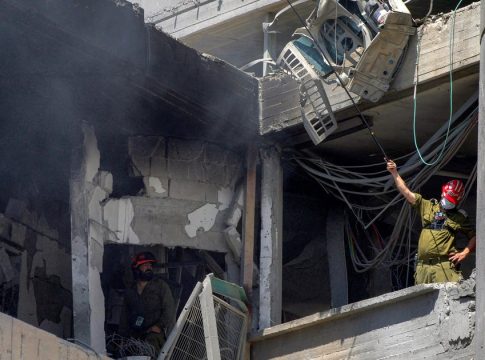Iranian Missile Strikes Hospitals and Buildings in Southern Israel, Escalating Tensions
Tel Aviv, Israel — In a dramatic escalation of hostilities, an Iranian missile struck the Soroka Medical Center in southern Israel early Thursday, resulting in multiple injuries and extensive damage. Israeli leaders quickly condemned the attack, promising a strong response targeting Iran’s military infrastructure and key political figures.
Attack Details and Immediate Aftermath
Israeli media outlets reported visuals of significant destruction, including shattered windows and heavy smoke emanating from the hospital’s upper floors. Thankfully, the area struck had been evacuated prior to the impact, leading to no serious injuries among patients or staff, according to a spokesperson for the facility. However, the Israeli Magen David Adom emergency service confirmed that at least 65 individuals were hurt nationwide, with three sustaining serious injuries from various missile strikes, including another that impacted a high-rise building near Tel Aviv.
Residents reported a chaotic scene as air defense systems intercepted multiple missiles, while some managed to break through, raising immediate fears among those trapped in affected buildings.
New Threat: Cluster Bombs
Amid these developments, Israel’s Home Front Command warned about a "new threat" posed by a missile containing cluster munitions, which disperses numerous smaller explosive devices over a wide area, amplifying the potential for casualties and destruction. Authorities urged caution and advised anyone encountering unexploded ordnance to avoid it and notify the authorities.
Reactions from Israeli Officials
In response to the missile strikes, Israeli Prime Minister Benjamin Netanyahu vowed to hold Iran accountable for what he described as an attack on Israeli sovereignty. "We will extract the full price from the tyrants in Tehran," he stated during a press briefing. Defense Minister Israel Katz echoed these sentiments, branding the Iranian actions as "war crimes" and insisting that Ayatollah Ali Khamenei would face consequences.
Broader Conflict and Military Responses
This incident comes amidst a wider military conflict, with Iranian officials asserting that their primary target was an Israeli military intelligence site rather than the hospital itself. Both Israel and Iran have engaged in a series of retaliatory strikes, leading to significant casualties on both sides. Reports indicate that at least 639 individuals in Iran, including over 200 civilians, have died due to ongoing hostilities. In retaliation, Iranian forces have launched approximately 400 missiles, resulting in the deaths of at least 24 people in Israel.
As tensions mount, U.S. President Donald Trump is weighing potential military involvement, as he considers whether to directly participate in Israel’s operations against Iranian nuclear sites. Senior officials within the U.S. Defense Department indicated that preliminary attack plans had been approved, though Trump has delayed a final decision.
Conclusion
As this situation evolves, the international community remains watchful. The escalation not only poses a direct threat to Israeli civilians but also risks triggering a broader conflict in the region. Israeli officials maintain a state of alert, and many hospitals have activated emergency protocols to protect patients amid the ongoing strikes.

Focuses on crime, public safety, and regional events.
Bio: Marcus is a community-based journalist passionate about reporting impactful stories that matter most to readers.

